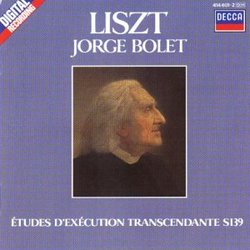| All Artists: Liszt, Bolet Title: Liszt: Trancendental Studies S.139 Members Wishing: 0 Total Copies: 0 Label: Polygram Records Release Date: 10/25/1990 Genre: Classical Style: Number of Discs: 1 SwapaCD Credits: 1 UPC: 028941460127 |
Search - Liszt, Bolet :: Liszt: Trancendental Studies S.139
 | Liszt, Bolet Liszt: Trancendental Studies S.139 Genre: Classical
|
Larger Image |
CD DetailsSimilar CDs
|
CD ReviewsGreat Liszt CD by Jorge Bolet Amy | 08/02/2007 (5 out of 5 stars) "Liszt's Transcendental Etudes are a set of studies that he dedicated to his teacher Karl Czerny. These studies should not be taken as separate pieces but looked at as one large work. They are similar to the set of Chopin's 24 Etudes. While both these works are often played in parts I strongly feel that the intentions of the composer have to be taken into consideration. For Chopin, the Etudes were based in every possible key therefore it would only be right to pay justice by playing or listening to the whole set. From the onset of the first Etude the Preludio, it is all pure virtuosity. There was even a second version in Liszt composed later which verged on the point of being virtually unplayable. The versions we now hear are the revised and final versions of 1851. I would love to hear both versions. The Transcendental Etudes are numbered 1-12 as follows:
1) Preludio C major 7 Eroica E flat major 2) Molto vivace A minor 8 Wilde Jagd C minor 3) Paysage F major 9 Ricordanza A flat major 4) Mazeppa D minor 10 Allegro agitato molto F minor 5) Feux Follets B flat major 11 Harmonies du soir -D flat major 6) Vision G minor 12 Chasse eige Bflat minor All te pieces are given names with the exception of Nos.2 and 10. It is also surprising to note that all of them have some sort of a story behind them. For example No.4: Mazeppa, a display of Liszt's graphic violence. The piece was inspired by the legendary Mazeppa, a Ukrainian nobleman caught in an amorous encounter with a count's wife. As punishment, he is tied naked to a wild horse which is then driven into the night. The piece accelerates in tempo, perhaps imitating the galloping horse, which eventually collapses. Bolet's recording shows his mastery of the pedal which gives it strength especially at the end. No.5, Feux follets, is equally hairraising in its dramatic impact, forged with awesome technical difficulty. No.6, Vision, sees the pianist polevaulting across the piano with its arpeggio chords something which must be seen to be truly believed. This is where you will understand why the word transcendental is truly appropriate to the music. Jorge Bolet has the pathos few can match. He plays with great magnificence in the first three pages, with great concentration in the left hand. Bolet provides a build-up which few modern pianists can emulate. I suppose this is something that he took with him to his grave. The last in the set is the Chasse-neige which can be viewed as the greatest of Studies. It is unique in its mood of desolation it has been poetically described as snow-flakes gradually covering and burying the whole world. A study of nature at her most merciless. Sadly, Bolet died in 1990 the year he made this recording from complications of AIDS. Liszt was his favorite composer and it seems fitting that this be the last recording he made before his death. " |

 Track Listings (12) - Disc #1
Track Listings (12) - Disc #1

